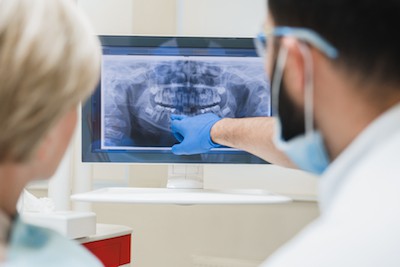
12 Nov What is Periodontal Screening and How Can You Benefit?
Benefits Of Getting A Periodontal Screening
Most adults know how important good dental care is, more importantly, preventative dental care. Regular dental cleanings and checkups can help to ensure that your teeth and gums stay healthy, and can also help to spot any potential problems early on when they are easier to treat. However, many people do not realize that there is more to good oral health than just brushing and flossing regularly.
One other dental care treatment that is important, but often overlooked, is a periodontal screening. What is periodontal screening and how can you benefit?
A periodontal screening is basically a thorough examination of your gums and the surrounding structures of your mouth, in order to check for any signs of periodontal (gum) disease. This exam can be done by your regular dentist, or by a periodontist, which is a dentist who specializes in the treatment of gum disease. The main benefit of getting this screening is that it can help to catch any early signs of periodontal disease before it has a chance to progress and become more serious.
There’s a lot more to cover when it comes to periodontal screenings and their benefits, so keep reading to learn everything you need to know!
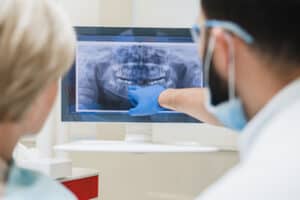
Periodontal Screening vs. Regular Dentist Check-Up
Firstly, it’s natural to wonder how periodontal screenings differ from your regular dentist visits. After all, during a regular dental check-up, your teeth and gums are already being examined.
The answer is that during a regular dental visit, the examination is not as thorough and is more focused on your teeth rather than your gums. Dentists are trained to look for signs of tooth decay and other problems with your teeth, but may not be as familiar with the early signs of gum disease. This is why it’s important to get a separate, periodic screening from either a periodontist or your regular dentist, who has been specifically trained in this area.
Who Should Get Periodontal Screenings And How Often
Even if you brush and floss regularly and think you aren’t at risk for gum disease, it’s important to get a periodontal screening at least once every year. This is because gum disease is often symptomless in the early stages, so you may not even realize you have it until it’s too late.
Some factors can increase your risk of developing gum disease, so if you have any of these it’s even more important to get regular screenings. These risk factors include:
- Smoking
- Diabetes
- Hormonal changes (such as during pregnancy)
- Certain medications (such as steroids, some cancer treatments, and certain types of antidepressants)
- A family history of gum disease
Any patient who is concerned about their risk for periodontal disease should speak to their dentist about how often they should be screened.
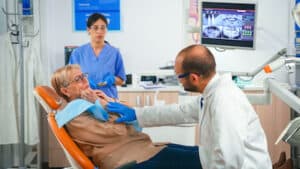
Preparing For A Periodontal Screening Appointment
A periodontal screening appointment is an important part of maintaining good oral health. During the appointment, a dentist or hygienist will examine your teeth and gums for signs of periodontal disease. They will also check for plaque and tartar buildup, which can contribute to gum disease. To prepare for your appointment:
- be sure to brush and floss your teeth thoroughly
- you should also avoid eating or drinking anything sugary or acidic before the appointment
During the appointment, here’s what you can expect to happen:
- First, the dentist or hygienist will ask you about your medical history and any medications you are currently taking. Be sure to mention any conditions that may put you at increased risk for periodontal diseases, such as diabetes.
- Next, they will visually examine your mouth, looking for any signs of inflammation or infection.
- They will also feel your gums to check for any tenderness or swelling. If they see any areas of concern, they may recommend further testing, such as X-rays, to get a better idea of the extent of the problem.
Based on the results of the examination, the dentist will develop a treatment plan.
Treatment Options For Periodontal Disease
If you have had a periodontal screening and your dentist determined that you have periodontal disease, don’t worry – there are treatment options available. The type of treatment recommended will depend on the severity of the disease.
- In the early stages of periodontal disease, a deep cleaning may be all that is needed to remove the plaque and tartar buildup and to help reduce inflammation. This type of cleaning is called scaling and root planing, and it is usually done over the course of two or three appointments.
- If the disease has progressed to a more advanced stage, other treatments may be necessary, such as antibiotics or surgery. However, with early detection and treatment, periodontal disease can be controlled and its progression halted.
- In severe cases, teeth may need to be removed.
Periodontal disease is a serious condition, but it is also preventable and treatable. By getting regular screenings, you can catch the disease early and get the treatment you need to keep your mouth healthy.
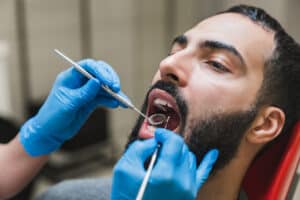
Preventing Periodontal Disease
As we mentioned earlier, there are certain factors that can increase your risk of developing gum disease. But there are also things you can do to help prevent it.
Here are some things you should do:
- Brush and floss regularly
- Visit your dentist for regular checkups and cleanings
- If you smoke, quit
- Eat a healthy diet
- Avoid eating foods that are rough on your gums (like chips and hard-crust bread)
- Manage any conditions (such as diabetes) that may put you at increased risk
By following these tips, you can help keep your mouth healthy and reduce your risk of developing gum disease.
In addition, make sure you get a periodontal screening at least once a year. If you do experience any symptoms of gum disease, such as redness, swelling, or bleeding gums, be sure to contact your dentist right away. With early detection and treatment, you can control the disease and keep your mouth healthy.
The Bottom Line
Regular periodontal screenings are an important part of maintaining good oral health and can help to catch gum disease early when it is more easily treatable. You should get screened for periodontal disease at least once every year, and more often if you have risk factors for the disease. Preparing for screening is easy – simply brush and floss your teeth before your appointment, and be ready to answer some questions about your dental history. During the screening, one of our dentists will examine your mouth for signs of gum disease. If we find any areas of concern, we may recommend further testing or treatment. Treatment options for gum disease range from changing your at-home oral care routine to surgery. Not getting screened for gum disease puts you at risk for serious complications like tooth loss, so please schedule an appointment with us today or with your local dentist!
Related Questions
Does insurance cover a periodontal screening?
Most insurance plans cover at least part of the cost of a periodontal screening, and we are happy to file insurance claims on your behalf. However, coverage varies from plan to plan, so we encourage you to check with your insurer before your appointment.
What is gum disease?
Gum disease (also known as periodontal disease) is a serious infection of the gums that can lead to tooth loss, bone loss, and other health problems. Gum disease is often painless in its early stages, but can cause red, swollen gums, bleeding when brushing or flossing, and bad breath. If left untreated, gum disease can damage the bones and connective tissue that support the teeth. In severe cases, it can even lead to tooth loss.
Can children get periodontal screenings?
Yes, children can get periodontal screenings, but the frequency and type of screening may be different than for adults. For example, a child who is at low risk for developing gum disease may only need to be screened once every few years, while a child who is at high risk may need to be screened more frequently.
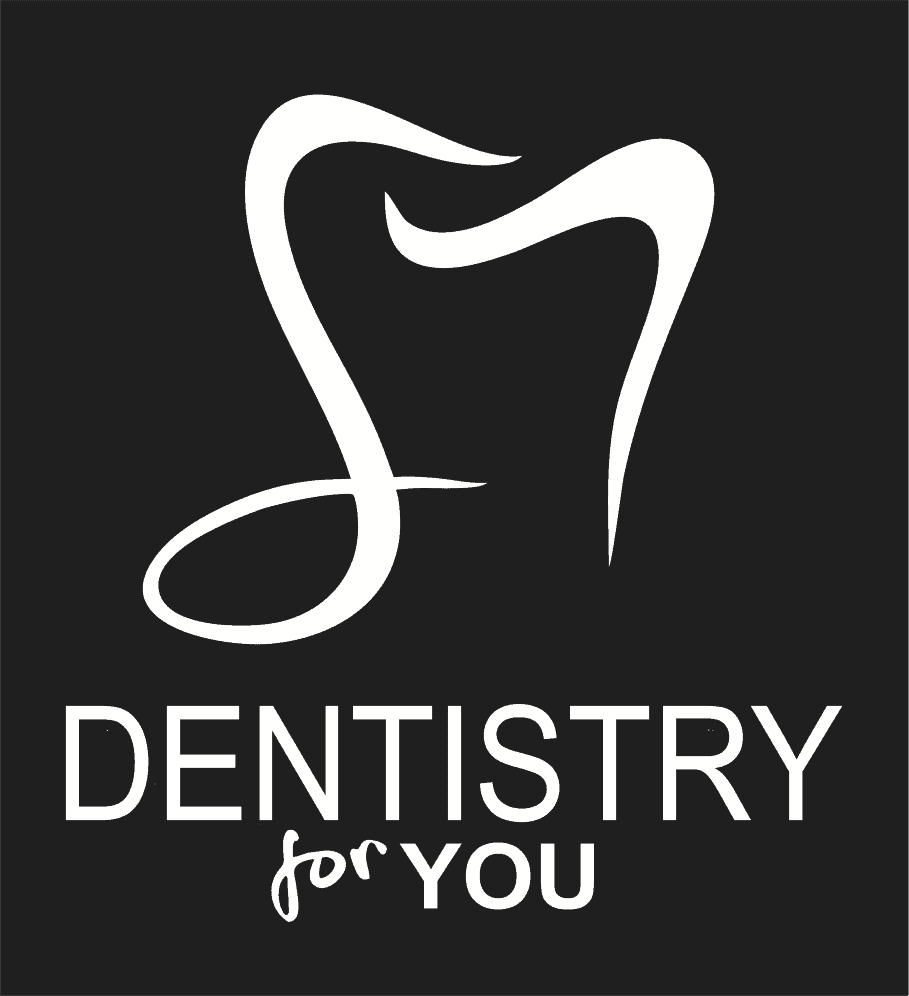




Sorry, the comment form is closed at this time.